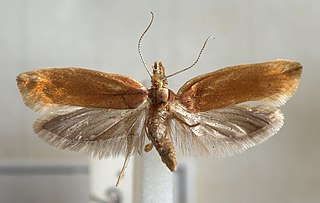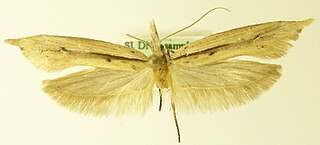
Ypsolopha scabrella, the wainscot hooktip or wainscot smudge, is a moth of the family Ypsolophidae. The species was first described by Carl Linnaeus in 1761. It is found in Europe, China, Russia, Asia Minor and mideast Asia.

Ypsolopha ustella, the variable ypsolopha moth, is a moth of the family Ypsolophidae. It is found in most of Europe and is also present in North America.

Ypsolopha mucronella is a moth of the family Ypsolophidae. It is found from Europe, through Siberia to Japan and in Asia Minor.

Hexadactilia trilobata is a moth of the family Pterophoridae described by Thomas Bainbrigge Fletcher in 1910. It is found in Australia in Queensland and New Guinea.
Trichoptilus scythrodes is a moth of the family Pterophoridae that can be found in Australia, including New South Wales and South Australia.
Batrachedra eremochtha is a species of moth of the family Batrachedridae. It is found in Australia.
Batrachedra eustola is a species of moth of the family Batrachedridae. It is found in Australia.
Batrachedra trimeris is a species of moth of the family Batrachedridae. It is found in Australia.
Ypsolopha barberella is a moth of the family Ypsolophidae. It is known from the United States, including Arizona, Nevada and Utah.
Ypsolopha oliviella is a moth of the family Ypsolophidae. It is known from the United States, including Arizona.
Ypsolopha arizonella is a moth of the family Ypsolophidae. It is known from the United States, including Arizona.
Ypsolopha schwarziella is a moth of the family Ypsolophidae. It is known from the United States, including Arizona, Utah and California.
Ypsolopha gerdanella is a moth of the family Ypsolophidae. It is known from the United States, including New Mexico.
Ypsolopha delicatella is a moth of the family Ypsolophidae. It is known from the United States, including Arizona and California.
Ypsolopha cockerella is a moth of the family Ypsolophidae. It is known from the United States, including New Mexico.
Ypsolopha nella is a moth of the family Ypsolophidae. It is known from the United States, including Arizona and Utah.
Ypsolopha querciella is a moth of the family Ypsolophidae. It is known from the United States, including Arizona and Utah.
Ypsolopha walsinghamiella is a moth of the family Ypsolophidae. It is known from the United States, including Arizona and California.
Ypsolopha buscki is a moth of the family Ypsolophidae. It is known from the United States, including Arizona.

Phalonidia lavana, or Platphalonidia lavana, is a species of moth of the family Tortricidae, the subfamily Tortricinae, and the tribe Cochylini. It has a terrestrial habitat and is found throughout North America. It does not have a Global Conservation Status Rank.




